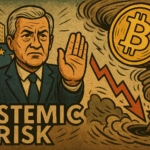New Regulatory Framework Enforces Strict Licensing for Digital Token Service Providers
In a significant tightening of regulatory oversight, Singapore’s central bank, the Monetary Authority of Singapore (MAS), has set a June 30, 2025 deadline for Singapore-based crypto firms to cease offering digital token (DT) services to overseas markets, unless properly licensed under the Financial Services and Markets (FSM) Act of 2022.
The directive applies to all Digital Token Service Providers (DTSPs) operating from Singapore, even if their primary customer base or operations are outside the country. Firms that fail to comply risk facing fines of up to 250,000 Singapore dollars (approximately $200,000) and imprisonment of up to three years.
No Transition Period for Overseas Crypto Activity
MAS announced the policy on June 1 in a formal response to industry feedback regarding the implementation of its proposed DTSP regulatory framework. The regulator emphasized that there would be no transitional arrangements for Singapore-based firms currently offering crypto services abroad.
“DTSPs which are subject to a licensing requirement under Section 137 of the FSM Act must suspend or cease carrying on a business of providing DT services outside Singapore by 30 June 2025,” the authority stated.
MAS clarified that any company, individual, or partnership incorporated in Singapore and engaged in digital token activity targeting overseas clients would be considered as operating from within Singapore and therefore subject to local laws, regardless of where their users are located.
Licensing Requirements and Limited Exemptions
Under the new framework, only firms licensed or exempted under existing financial laws — including the Securities and Futures Act, Financial Advisers Act, or Payment Services Act — may continue offering certain services without violating the new DTSP rules.
Even so, MAS made it clear that licenses for overseas-targeting DTSPs would be granted only in rare cases, citing heightened concerns over Anti-Money Laundering (AML) and Counter-Terrorist Financing (CFT) compliance.
Hagen Rooke, a Partner at Gibson, Dunn & Crutcher, noted in a LinkedIn post that MAS is unlikely to approve many licenses under the new regime:
“The MAS will grant licences under the new framework only in extremely limited circumstances, as this type of operating model generally gives rise to regulatory concerns, e.g. AML/CFT-related.”
Rooke further advised affected companies to consider restructuring operations to eliminate their Singapore nexus and de-risk exposure to enforcement under the FSM Act.
Hefty Penalties for Non-Compliance
Section 137 of the FSM Act stipulates that all DTSPs based in Singapore are deemed to be operating from Singapore, even if their operations are directed entirely abroad. This regulatory presumption removes a common loophole used by crypto firms to register locally while conducting unregulated foreign operations.
Violators of the law face the possibility of:
-
Fines up to 250,000 SGD (~$200,000 USD)
-
Imprisonment for up to 3 years
-
Additional penalties for repeat offenses or breaches involving AML/CFT failures
MAS has made clear that enforcement will be swift and strict, signaling that regulatory arbitrage — the practice of exploiting jurisdictional gaps — will no longer be tolerated under Singapore’s crypto framework.
Focus on Cross-Border Crypto Risk Mitigation
This move is part of a broader regulatory initiative to address cross-border risks posed by the crypto sector. When Singapore’s Parliament passed the FSM Act in April 2022, it empowered MAS to regulate digital token services provided abroad by Singapore-based entities.
MAS has expressed concerns that crypto firms may use Singapore as a regulatory haven while offering unlicensed services elsewhere, potentially exposing global markets to financial crime risks and undermining international AML/CFT efforts.
By closing this loophole, the MAS aims to ensure that Singapore-incorporated DTSPs uphold the same standards regardless of the markets they serve.
“The provision of digital token services outside Singapore by DTSPs can give rise to reputational and financial integrity risks for Singapore,” the MAS stated in a prior consultation.
Industry Implications and Strategic Considerations
Singapore has long been regarded as a crypto-friendly financial hub, attracting startups and institutional players from across the globe. However, the new policy marks a decisive shift toward stricter compliance and regulatory accountability, especially for firms targeting overseas markets.
Industry participants will now need to evaluate:
-
Whether to apply for licenses under the new regime (despite the low probability of approval)
-
Whether to exit international markets
-
Whether to relocate operations or adjust legal structures to avoid falling within Singapore’s regulatory scope
While some may interpret this move as a deterrent to innovation, regulators argue it is necessary to maintain Singapore’s reputation as a clean, well-governed financial center.
Conclusion
The June 30, 2025 deadline issued by the Monetary Authority of Singapore marks a significant regulatory pivot for the country’s crypto industry. By requiring Singapore-based crypto firms to either cease overseas operations or obtain difficult-to-get licenses, MAS is sending a strong message about its commitment to AML/CFT standards and global financial integrity.
Firms with international ambitions must now decide whether to restructure, relocate, or exit the market — or face the consequences of non-compliance. As regulatory scrutiny continues to tighten globally, Singapore’s policy could set a precedent for how jurisdictions manage cross-border crypto activities in the years ahead.












